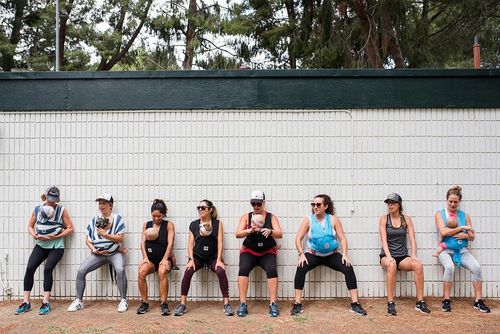Breastfeeding and exercising can be a beneficial combination for new mothers, offering numerous advantages for both their physical and mental well-being. While you may be concerned about how exercise affects breastfeeding, numerous studies support the idea that a well-balanced exercise routine can enhance the breastfeeding experience and contribute to overall maternal and infant health.

5 Myths about Breastfeeding & Exercising
FIT4MOM x Jessica Maurer x Jessica Koiner
There are several myths and misconceptions surrounding breastfeeding and exercise. These myths can sometimes deter or confuse new mothers trying to incorporate physical activity into their postpartum routines while breastfeeding. In this blog, Jessica Koiner, owner of The Milk Box Lactation, LLC, a Board Certified Lactation Consultant (IBCLC), and an instructor at FIT4MOM Fort Worth, will help us debunk some of these myths.
Jessica shares, "When a baby is born, so is a mother. This can be an extremely challenging time as you not only embark on the journey of rediscovering yourself but also find yourself required to give your time, body, and physical energy in a whole new way. It is empowering to know that breastfeeding doesn’t need to push pause of your life! It brings me great joy to support families in gaining a deep understanding of breastfeeding and navigating its many nuances."

Myth #1: Exercise can negatively affect breast milk supply.
Some moms may express concern about exercise’s effect on breastfeeding. Research published in the New England Journal of Medicine confirm that low- and moderate-intensity aerobic exercise, performed four or more days per week after 12 weeks post-birth, has no adverse effects on breast milk volume or composition, infant intake, or growth rate while providing significant improvement in cardiovascular fitness of the mother.
Myth #2: Exercise can drastically change the taste of breast milk.
As you move into postpartum fitness after her 4th Trimester, the lactate levels in your body tend to increase to some extent with more intense exercises. Lactate is a byproduct of the anaerobic breakdown of glucose during intense exercise when oxygen demand exceeds supply. This means the levels do not increase while you perform low to moderate-intensity movements, as you should not be without oxygen at any part of the workout.
While some studies have shown a mild increase in lactate levels during high-intensity movement, it is essential to understand that this is a normal physiological response and not necessarily harmful to you or the babe. Moderate lactate buildup can serve as a valuable energy source for the body, especially during shorter bursts of activity. The increase is temporary, and once you rests and resume normal breathing, your body will efficiently metabolize and clear the excess lactate. This process can alter the taste of breast milk, making it less acceptable to some infants, but no adverse effects on breast milk quality or any potential risks to the baby have been proven.

Myth #3: You must wait until you've weaned your baby to start exercising.
Absolutely not! It's recommended to start gentle walking and mobility exercises as soon as you feel physically capable within your 4th Trimester. For more guidance, please see our “Safe Postpartum Exercise Tips to Get Moving After Baby.”
Myth #4: You need super expensive equipment or clothing to workout while breastfeeding.
Wearing a supportive bra and nursing pads during exercise can provide comfort and prevent leakage. Jessica shares with us, "It's wise to choose a wire-free, supportive bra that isn't overly tight. Excessive restriction of movement can lead to inflammation.
Prior to your workout, it can be beneficial to either pump or breastfeed. If your workout doesn't align with your feeding schedule, a brief pump session of less than 5 minutes can help relieve any added pressure or weight. However, this step is not necessary if you're comfortable without it.
Here's another pro tip: make sure to wear fresh, clean breast pads during your workout and replace them once you're done or after you've cleaned up."

Myth #5: It's painful to exercise while breastfeeding.
As mentioned above, timing workouts around breastfeeding sessions may be necessary to prevent discomfort from engorged breasts. You should breastfeed or pump prior to movement. This will also help you feel more comfortable while building a healthy habit.
As you progress past your 4th Trimester, additional considerations can help you feel comfortable while exercising. “Consider low-impact exercises that minimize excessive bouncing for your breasts. If you enjoy a more challenging workout, try crossing your arms over your chest to help stabilize your breasts,” says Jessica.
As always, it's crucial for mothers to listen to their bodies, stay well-hydrated, and consult with healthcare professionals if they have any concerns about exercising while breastfeeding.
Ready to learn more? Our brand new FIT4MOM Prenatal and Postnatal Fitness Certification is designed to empower fitness professionals to connect with moms at every age and stage of motherhood. With nearly 4,000,000 births per year, it's crucial to equip fitness professionals with the knowledge and tools required to guide moms on their unique fitness journeys. Our comprehensive course breaks down the science behind training the changing female mind and body, providing a deep dive into prenatal and postnatal fitness education.
With the FIT4MOM Prenatal & Postpartum Fitness Certification, you'll gain a profound understanding of the physical and mental changes that occur during pregnancy and postpartum. This course covers everything from exercise guidelines per trimester to the importance of pelvic floor health for pregnant and postpartum women. We'll provide you with the expertise needed to customize workouts for the individual needs of your clients and support them across various movement styles, training sessions, fitness classes, and more.
WANT TO LEARN MORE?
Bringing new life into the world is a miraculous and life-altering experience, but it's no secret that pregnancy and postpartum can bring a whirlwind of changes to a woman's body. As a fitness professional or health enthusiast, you have the power to support and empower mothers on their journey to a healthy pregnancy, a smoother birth experience, and a robust postpartum recovery.
Register here to receive more information for training the female client.

